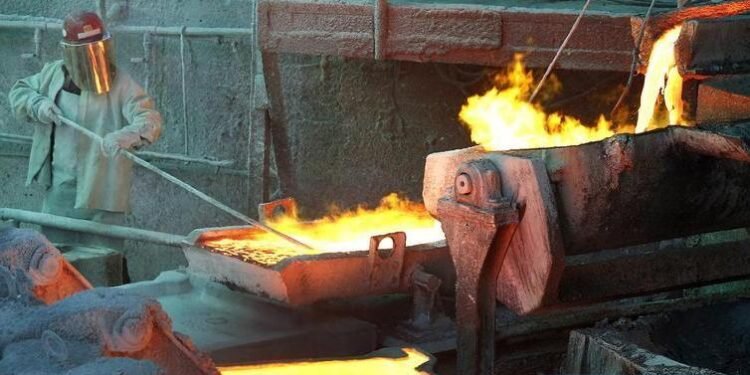
China has allowed more private firms to blend more polluting complex copper concentrates domestically as the country that smelts half the world’s copper struggles to secure enough standard grades, three people with knowledge of the matter said.
That could significantly widen the scope of copper concentrates, which are currently subject to strict customs rules, that China can import. Its Ministry of Ecology and Environment did not immediately respond to a request for comment.
China is the world’s largest copper consumer but only the fourth biggest mined producer, meaning it has to import concentrate – a material produced from crushed copper ore which is later processed into refined metal – to meet its needs.
Its import standards allow only around 20% of the world’s copper concentrates to be shipped into the country, with the remainder considered too polluting.
Only giant state-owned enterprises have typically been allowed to buy and blend copper concentrates that contain more toxic chemicals like arsenic than standard grades.
Foreign traders, also barred from processing polluting concentrates within China, have to blend concentrates in South Korea, Malaysia and Taiwan prior to sale to Chinese smelters.
But the government has granted at least three new licenses to private firms to process lower grades over the past few months as a shortage of standard copper concentrates worsened, three sources said.
One of them includes the new blending facility in Dalian port, the Liaoning provincial government of northeast China said on Nov. 1.
China has rapidly expanded in copper smelting over the years, accelerating a global shortage of copper raw material and making concentrates costlier than ever.
A lack of copper concentrates has already led to forced stoppages of some of China’s most ambitious copper projects, including the postponement of Tongling Nonferrous’s new plant to the second half of 2025.
Around 3.2 million tons of new Chinese copper smelting capacity is also waiting to come online in the next five years, according to consultancy CRU.
(Reporting by Julian Luk; Editing by Jan Harvey)









![[Industry Insight] University partnership pioneers siltation management training](https://lbnntv.com/wp-content/uploads/2024/06/Industry-Insight-University-partnership-pioneers-siltation-management-training-120x86.jpg)
